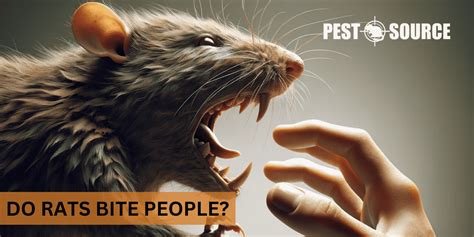5 Ways Rats Attack People: What You Need to Know

In the shadowy corners of urban alleys and rural barns alike, rats have long been viewed as pests, but their potential to pose a direct threat to humans is often underestimated. While rat attacks on humans are relatively rare, they do occur, and understanding the circumstances under which these incidents happen can help mitigate risks. Rats, primarily driven by survival instincts, may resort to aggression when they feel threatened, cornered, or in need of protecting their young or food sources. Here are five ways rats might attack people, along with insights into prevention and response.
1. Defensive Bites When Cornered
Rats are naturally cautious creatures, but when they feel trapped or threatened, their fight-or-flight response can lean toward aggression. This often happens when a rat is accidentally cornered in a confined space, such as a closet, garage, or even a bed. In such situations, a rat may bite defensively to escape.
Expert Insight: Rats have sharp incisors capable of breaking through skin, and their bites can transmit diseases like leptospirosis or rat-bite fever. Always approach rats with caution and avoid cornering them.
2. Protecting Nests or Young
Mother rats are fiercely protective of their nests and offspring. If a human inadvertently gets too close to a rat’s nesting area, the rodent may attack to defend its young. This behavior is more common in areas where rats have established colonies, such as attics, basements, or outdoor burrows.
Prevention Tip: Seal entry points to your home and keep food stored securely to discourage rats from nesting indoors.
3. Scavenging for Food
Rats are opportunistic feeders and will aggressively defend food sources if they feel threatened. This can lead to attacks if a human interrupts a rat while it’s feeding, such as in kitchens, garbage areas, or outdoor picnics. Hungry rats, particularly in densely populated urban areas, may become bolder in their search for sustenance.
Safety Measure: Store food in airtight containers and promptly clean up spills or crumbs to minimize rat attraction.
4. Disease-Induced Aggression
Rats infected with diseases like rabies or toxoplasmosis may exhibit abnormal behavior, including increased aggression. While rabies in rats is rare, other illnesses can alter their behavior, making them more likely to attack without provocation.
Key Takeaway: Never handle a rat, especially one displaying unusual behavior, without proper protection. Seek medical attention immediately if bitten.
5. Overpopulation and Resource Scarcity
In areas with high rat populations, competition for resources can lead to increased aggression. Rats may become more daring in their interactions with humans, particularly if their natural food sources are depleted. This is often seen in urban environments where rats have adapted to human presence.
Expert Insight: Integrated pest management strategies, including trapping and habitat modification, can help control rat populations and reduce the likelihood of attacks.
Preventing Rat Attacks: Practical Steps
- Seal Entry Points: Use steel wool or caulk to close gaps in walls, floors, and foundations.
- Maintain Cleanliness: Dispose of garbage regularly and keep food areas spotless.
- Use Traps Wisely: Place traps in areas of high rat activity, but keep them out of reach of children and pets.
- Consult Professionals: For severe infestations, hire pest control experts to address the problem safely.
Historical Context: Rats and Human Health
Rats have been linked to some of history’s deadliest pandemics, including the Black Death in the 14th century. While modern sanitation has reduced the risk, rats remain carriers of diseases like hantavirus and salmonellosis. Understanding their behavior is crucial for public health.
Future Implications: Urbanization and Rat Behavior
As cities expand and human-wildlife conflicts increase, rats may become more habituated to human environments. Climate change and shifting ecosystems could further alter their behavior, making proactive pest management essential.
Can rats attack without being provoked?
+While rare, rats may attack unprovoked if they are diseased, protecting their young, or under extreme stress. Always exercise caution around rats.
What should I do if bitten by a rat?
+Wash the wound thoroughly with soap and water, apply an antiseptic, and seek medical attention immediately to prevent infection.
Are pet rats dangerous?
+Pet rats, when properly cared for, are generally docile and unlikely to attack. However, they can bite if mishandled or stressed.
How can I tell if my home has a rat infestation?
+Look for droppings, gnaw marks, grease rubbings along walls, and nesting materials. Unusual pet behavior may also indicate rats.
While rat attacks on humans are uncommon, they serve as a reminder of the importance of coexistence with wildlife. By understanding rat behavior and taking preventive measures, we can minimize the risk of conflicts and ensure safer environments for both humans and rodents.